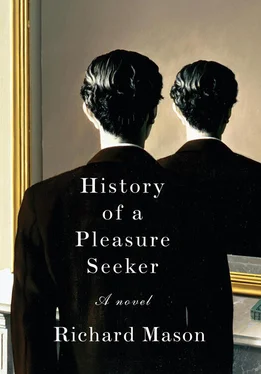“My son needs to learn to leave the house without having hysterics.”
“I understand that, sir.”
“Very well. You have impressed my wife and I am prepared to retain you. Have you any questions?”
“I do, sir.”
“What are they?”
The moment had come and Piet steeled himself to seize it. “They concern the remuneration.” He spoke as though the subject were infinitely distasteful to him.
“Sixty guilders a month, Saturday afternoons and two Sundays off, free board and lodging, and two weeks’ holiday.”
“I am content with the other terms, Mr. Vermeulen-Sickerts. But I am afraid the salary prevents me from accepting the position.”
“I beg your pardon?”
“My father is elderly and I wish to marry one day. I am not in a position to work for sixty guilders a month.”
The effrontery of this astounded Maarten, but it also impressed him. He approved of people who valued themselves highly, provided they had valid grounds for doing so. “It is an excellent rate, Mr. Barol. You would be hard-pressed to equal it elsewhere.”
“As a tutor, perhaps, sir. But I am young and have other opportunities.”
“That pay more?”
“That could, in time, pay a great deal more.” A trickle of sweat ran down the inside of Piet’s left arm. He will not dismiss me now, he thought.
He was right.
Maarten hesitated, then said, “Very well, Mr. Barol. You drive a hard bargain, but that does not count against a man in my book. What sum do you propose?”
“A hundred, sir.”
“One hundred guilders!”
“Yes, sir.”
There was silence. Piet held it. Maarten thought of a similar incident in his own twenties when he had stubbornly refused seventeen offers for his ice, even as it lay melting in New York harbor. He was prepared to spend large sums on those he loved and had larger sums at his disposal than all but five or six men in Amsterdam. “Very well, Mr. Barol,” he said, at last. “But I will expect the best of you, young man.”
“You shall have it.”
“I will not tolerate lateness or immorality. We keep an orderly, respectable, God-fearing establishment.”
“Which is the position’s chief attraction for me, sir.”
While this exchange was taking place, Agneta Hemels took a perfect curl of blond human hair from a drawer lined in peach-colored velvet and went to pin it to Jacobina’s head. “Up tonight or down, madam?” She asked the question as though its answer were a matter of grave concern to her.
Jacobina contemplated herself in the dressing table mirror and changed her mind. “Down, I think. Simple and young. The way Louisa had her hair for the de Jongs’ last month.”
Agneta’s heart sank: Louisa’s hairstyles, though simple in effect, were far from simple to achieve. “Has madam found a tutor for Master Egbert?” She took the tortoiseshell comb and teased apart the strands for the first braid of the first plait.
“I suppose so.”
“We all pray for his success.” Agneta had learned that the easiest way to avoid an overfamiliar curiosity in her superiors’ lives was to have no genuine interest in them whatsoever. This allowed her to remain composed, whatever she saw. “Was madam able to lunch between so many appointments?” Her tone was superbly solicitous.
Like Piet Barol, Agneta Hemels did not intend to work for the Vermeulen-Sickertses forever; like him, she wished for herself a comfortable life and was determined to get it. Their ambitions varied only in their scope. Agneta wanted to be a housekeeper with a large staff under her, somewhere out in the country, away from the stinks of Amsterdam, a place where others would bring her tea in her own private room and she would never have to rise before 6:00 a.m. unless the roof was burning.
“No time for lunch. I’m famished.”
“Would madam like a little bouillon before dinner to keep her strength up?”
“No, no. Just attend to my hair.” Jacobina was thinking about what she would wear. Her evening dresses suddenly seemed matronly. “Is the blue flowers on gold in a state to be seen?”
“All madam’s dresses are kept ready, for whenever madam wishes them.” Agneta was responsible, among many other things, for the maintenance of Jacobina’s wardrobe. She was aware that the garment in question no longer fitted its owner. “Madam might be cold in that dress! What about the green velvet with the embroidered leaves? That’s very becoming for winter.”
But Jacobina had her mind set on the blue flowers.
“Of course, madam.” Agneta finished Jacobina’s hair, refusing to draw any connection between the arrival of a young man and her mistress’ choice of a low-cut dress. She went into the dressing room next door and returned with a silk garment bag, from which she removed the gown Jacobina had asked for.
“You’d better bring a corset.” Like her elder daughter, Constance, Jacobina Vermeulen-Sickerts was an enthusiastic champion of form-enhancing undergarments and had absolutely refused Louisa’s request that they be banished from the house on grounds of health and female self-respect.
“Which one would madam like?” Ten years in service had taught Agneta Hemels that when the vanity of fine ladies is wounded, it is their servants who suffer. She did not wish to be responsible for selecting a corset that failed to squeeze Jacobina into the dress she had chosen.
“The blue one, with the red ribbons. It’s the tightest, isn’t it?”
“What a memory madam has.” Agneta fetched it and took the silk dressing gown from Jacobina’s shoulders, helped her into her drawers, knelt at her feet, rolled the stockings up her legs and fixed them to the garter belt. Then, making one last effort, she said, “Is madam sure she wouldn’t prefer—”
“I’m wearing the blue flowers. Lace me up.”
Agneta did her best. She was a delicately made woman in her early thirties with pale hair and freckles, not overly strong. She tugged as hard as she could while Jacobina blew all the air from her lungs; then she laced up her employer, hoping she wouldn’t pass out, and arranged the dress on the floor. Jacobina stepped into it and succeeded in getting her arms through the correct holes, but only by bending almost double. The narrow waist required several violent tugs to fit over her thighs and there remained inches of corset visible between the back buttons, which would not fasten. Even Jacobina could see it was impossible. For a moment she was gripped by a wild fury, but with an effort of will she laughed off the attempt and gave Agneta the dress, which she never wanted to see again.
Agneta Hemels was not invited anywhere where the wearing of such a thing would be appropriate. Nevertheless, she knew precisely what she could get for the fabric if she sold it to a cushion maker and her gratitude was real enough.
“Perhaps I will wear the green velvet,” said Jacobina, to silence her maid’s effusiveness. “It is chilly tonight, after all.”
Maarten led Piet to the dining room himself. The ladies had not yet come down and he used the interval before they did to tell Piet, at some length, about the objects it contained. The table was Georgian, bought at an auction in London; the chairs were Louis XVI, resprung and upholstered in olive green and white. The gilt salt cellars came from Hamburg, the clock on the mantelpiece from Geneva, the figures beside it from the Imperial Porcelain Factory in St. Petersburg. None of this detail was lost on Piet, who had a fine and instinctive appreciation of beauty. He showed this by judicious questioning that began to ease his employer’s mistrust of good-looking young men.
The arrival of Constance Vermeulen-Sickerts was preceded by a clattering of high heels and a potent aroma of lilies of the valley. She was twenty-one years old, short and blond and confident, and her glance took in the cut of Piet’s suit and the elegance of his shoes — his only pair, bought like everything else he owned from a cash-strapped undergraduate of means. She was a kindhearted person, though apt, like Louisa, to make snap judgments; and she felt rather sorry for Piet that her sister should have chosen the evening’s menu with the aim of testing the new tutor’s table manners. “Do sit down, Mr. Barol. We are not ceremonial in this house.” She took a chair next to the fire as her mother and sister entered the room.
Читать дальше












